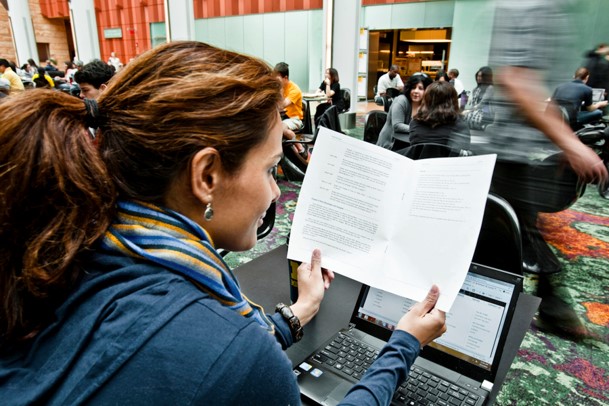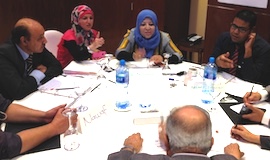The Center for International Private Enterprise (CIPE), WDI, and Tenmou (a Bahrain-based angel investor network) and a consortium of U.S. and Bahraini stakeholders collaborated to strengthen the Bahraini entrepreneurial ecosystem through encouraging investment, advancing business growth for Bahraini startups and micro, small and medium enterprises (MSMEs); and increasing access to finance and strengthening the Foreign Trade Agreement-based US-Bahraini commercial relations. Under this project, which is funded by the Middle East Partnership Initiative (MEPI) of the U.S. State Department, WDI supported Tenmou with the delivery of a mentorship program, which matched two cohorts of 25 Bahraini MSMEs with a mentor. Mentors provided their mentees with one-on-one guidance over four months. At the end of each cohort, a select number of SMEs participated in a pitch night where they pitched their business to a panel of investors. WDI trained the mentors on how to work effectively with their mentees through a mentorship toolkit, short videos, and live webinars with a mentorship expert. Based on learning from the program, WDI published an article on NextBillion: “Seven Keys to Successful Business Mentorship Programs: How Entrepreneur Support Organizations Can Maximize Their Impact.” Through WDI Publishing, WDI developed two business cases featuring entrepreneurs from the program, appropriate for adoption in both entrepreneurship training programs in non-academic settings and university courses.
WDI led two virtual training sessions on gender lens investing (GLI). The sessions focused on inspiring Bahraini investors to promote gender equity and integrate gender considerations into their investing approach, as well as how to apply a gender lens to business operations and understanding financial gains of different GLI strategies. WDI also participated virtually in two training sessions on FinTech which focused on: 1) advantages of utilizing FinTech to advance business growth and 2) returns on investing in the FinTech sector and digitization.

WDI Publishing is organizing a new competition for case studies focusing on the unique advantages and challenges of doing business in the Middle East and North Africa (MENA) region.
Submissions for the competition, “Doing Business in the Middle East, North Africa Region,” should focus on a business dilemma of an organization or company located or doing business in the MENA region. The cases may feature a small or large organization, private sector multinational, non-governmental organization (NGO) or nonprofit.
The global competition is open to individual students or student teams, as long as they enter in collaboration with a faculty member from a degree-granting university or college. Faculty or faculty teams may also enter as long as they are currently teaching at a degree-granting university or college. Other individuals may also enter, provided they do so in collaboration with a faculty member from a degree-granting university or college.
The winning entry will be awarded $5,000. Second place will earn $3,500 and third place $1,500. Additionally, all three winning cases will be published by WDI Publishing and added to its case catalogue. Entry forms are due Dec. 12, 2019, and the final case and teaching note must be turned in by Feb. 9, 2020. Winners will be announced on March 20, 2020.

To learn more about key deadlines, entry requirements, judging criteria and to access entry forms and submission documents, click here. For resources on how to write a case study and a teaching note, along with other helpful information, click here.
WDI Publishing has assembled an impressive panel of judges for the competition. They are:
Kim Bettcher – Center for International Private Enterprise (CIPE)
Andrew J. Hoffman – University of Michigan Ross School of Business
Manel Khadraoui – University of Tunis/Tunis Business School
Hagop Panossian – American University of Beirut Olayan School of Business
WDI Publishing Manager Sandy Draheim said she hopes the competition will encourage the development of new, academic case studies about the MENA region, increase the understanding of doing business there and grow the critical thinking skills of university students in these countries through the use of these new MENA-focused cases.
“There are many regions of the world that could use more ‘localized’ business case studies for higher education,” Draheim said. “But, partly based on the incredible response, interest and results of WDI’s M²GATE program, we thought it would be interesting to target our first geographically-themed case competition around MENA issues. We want to elevate the quality and quantity of teaching materials that provide students – both in the MENA region and around the world – with opportunities to take on the roles and responsibilities of managers in organizations located or doing business in this region.”
In January, two members of WDI’s new Entrepreneurship Development Center, part of the Institute’s Education Initiative, traveled to Bahrain to work with Tamkeen, a government-affiliated organization in Bahrain tasked with developing the country’s private sector.

Millie Chu, Diana Paez-Cook and Kristin Babbie stand in front of the Bahrain Chamber of Commerce and Industry Building.
“We collaborated with the team at Tamkeen to put together a results-based monitoring and evaluation framework focused on developing objectives, outcomes, outputs and indicators for their new Entrepreneurship Mentoring program,” said WDI’s Kristin Babbie. “They wanted to be able to articulate the results of the mentoring program on the entrepreneurs who participated and demonstrate its impact.”
Since 2014, WDI, in partnership with the Center for International Private Enterprise (CIPE), has helped develop entrepreneurship training and mentorship programs in Bahrain.
Babbie and WDI’s Diana Paez-Cook spent one week in Bahrain, an island nation in the Persian Gulf. Paez-Cook said WDI also worked with the Entrepreneurship Mentoring team at Tamkeen to ensure it fit their needs.
“They are now able to populate the framework and use it as a management tool for their program, as well as adapt it to their evolving needs,” said Paez-Cook, who also is director of WDI’s Grants Management team.
She and Babbie, who also is a senior project administrator on the Grants Management team, will guide Tamkeen in the M&E process over the first year of the Entrepreneurship Mentor program. The program is scheduled to launch this spring.
“We will provide support when requested in terms of entrepreneurship indicators related to mentoring, as well as guidance in terms of data collection tools and approaches that they might require,” Paez-Cook said.
During their recent trip to Bahrain, Paez-Cook and Babbie also discussed developing a coaching program with Tamkeen’s Coaching Team. While a typical mentoring engagement lasts 9-12 months or longer, a coaching relationship would target a specific problem an entrepreneur has and would end once the problem is resolved.
Accompanying the two on the Bahrain trip was Millie Chu, a WDI consultant. Chu and the WDI team discussed with Tamkeen what a coaching program would look like, and what resources the Institute could provide. Paez-Cook said discussions with Tamkeen on a coaching program will continue.
WDI’s entrepreneurship training, mentorship training and capacity-building work in Bahrain are some of the WDI Education Initiative’s key focus areas, and builds on one of its areas of strength and expertise.
WDI’s original work in Bahrain, started three years ago, focused on entrepreneurship training. The government had begun several entrepreneurship initiatives unique to the region. But it became clear that the initiatives lacked qualified entrepreneurship instructors to deliver training programs.
To address the need for qualified trainers, Washington, D.C.-based CIPE asked WDI to develop an entrepreneurship instructor’s manual and leadership curriculum.
The training materials incorporate leadership, critical thinking, active citizenship, ethics, and decision-making techniques into the existing curricula. It is used in the training of Bahrain’s trainers, and subsequently by the trainers in their entrepreneurship education programs.
Julie Felker, a WDI faculty affiliate, wrote the leadership curriculum. She traveled to Bahrain in late 2014 to hold a workshop for trainers involved in Bahrain’s entrepreneurship initiatives and education programs to implement the training in conjunction with CIPE. Felker’s workshop included discussions on leading practices that were part of the newly developed materials and was tailored to address the needs of the Bahraini trainers.
Building on this collaboration, WDI sent Peter Scott, professor of entrepreneurship at the Whitman School of Management at Syracuse University and author of an entrepreneurial training guide, to Bahrain in March 2015. The guide provides skills, “how to” examples, and resources to teach entrepreneurship and make the process experiential, or real, for the student.
Also in March 2015, WDI Faculty Affiliate Matt Brown traveled to Bahrain to present a comprehensive entrepreneur mentoring guide he developed to help Tamkeen create a program specifically for the country’s entrepreneurs. Two months later, he returned to deliver a two-day “train the trainer” workshop for those interested in mentoring new and existing Bahraini entrepreneurs.
The Bahrain project also builds on WDI’s long track record of providing entrepreneurship education in emerging markets. For example, working with Goldman Sachs’ 10,000 Women project, WDI designed and delivered 12, six-month entrepreneurship programs at the College of Business and Economics at the University of Rwanda in Kigali. In all, more than 300 women graduated from the program, which included modules on “Introduction to Business Strategies,” “Marketing, Negotiations & Customer Care,” “Operating a Business in Rwanda,” “Budgeting & Management Accounting,” “Financial Management & Loans” and “Developing a Successful Business Plan.”
And the U.S. State Department’s Middle East Partnership Initiative awarded WDI a grant to provide training for entrepreneurs from throughout Morocco. The training consisted of sessions in marketing, strategy, accounting, finance and exporting. The grant was renewed the following year based on successful delivery. WDI partnered with Moroccan-based Al-Akhawayn University to offer a total of six training programs in Morocco.
In a first for WDI, two managers visited Cuba last month to assess how the Institute could assist the country’s burgeoning entrepreneur community.

Amy Gillett, vice president of the Education Initiative, and Diana Paez-Cook, senior program manager of the Grants Management team, were part of a 20-person delegation that traveled to the island nation in May as part of a culture and policy trip organized by the travel company Insider Expeditions. Many on the trip were lawyers, policy development professionals, and lobbyists who hoped to learn more about Cuba’s economic transition.
That transition is slowly developing in the wake of renewed diplomatic ties between Cuba and the United States, and President Barack Obama’s historic trip to Havana in March. While it still operates a largely state-controlled economic system, the Cuban government has begun to make changes by permitting more of its citizens to operate private businesses.
WDI was founded in 1992 shortly after the collapse of communism in the Soviet Union as a way to help firms and organizations in formerly closed economies transition to a more free market economy. Cuba is viewed as the last of the Soviet bloc countries to transition to a more open economy.
Over the years, WDI has provided entrepreneurship training in Morocco, Rwanda, and Bahrain, and delivered business education training workshops to thousands of managers in former Soviet bloc countries.
Paez-Cook said the visit she and Gillett made to Cuba was invaluable because of the knowledge gained about the current situation on the ground and the connections made during the visit. She said the pair has a much better understanding of Cuba, which is “its own unique universe.”
While WDI typically works in partnership with local organizations to provide entrepreneurship training and other programs, the current system in Cuba has prevented the development of an organized civil society. A traditional approach of seeking out a partnership with an NGO will therefore not be viable at this time. Instead, Paez-Cook said WDI would need to cultivate relationships with individuals, educational institutions, and other entities to find ways to engage and support the transition.
Another factor on how open Cuba becomes is the outcome of the U.S. presidential elections. The next president will have the opportunity to build on the progress made by the Obama administration and work with the successor to current Cuban president Raul Castro, who plans to step down in 2018.
Paez-Cook said WDI will explore opportunities for engagement over the next few months.
“As economic and policy changes continue in Cuba in the medium- to long-term, entrepreneurship training and technical assistance could go a long way in providing Cuban entrepreneurs with tools and techniques to sustain successful businesses,” she said. “That said, any entrepreneurship program in Cuba would have to be uniquely tailored to the current context and conditions, and leverage the amazing creativity and resourcefulness of the Cuban people. It will be important to work in partnership with Cubans every step of the way to assist with their needs and learn from them as well.”
 Gillett said she was struck by the entrepreneurial spirit among Cubans, who are very interested in potential economic opportunities. She encountered a man who had a license from the Cuban government to operate a coconut water stand. Since resources are severely limited, the vendor works with what he can find, including the coconuts he harvests from nearby trees.
Gillett said she was struck by the entrepreneurial spirit among Cubans, who are very interested in potential economic opportunities. She encountered a man who had a license from the Cuban government to operate a coconut water stand. Since resources are severely limited, the vendor works with what he can find, including the coconuts he harvests from nearby trees.
“After meeting small-scale entrepreneurs and gaining a deeper understanding of the economic situation, we’re in a great position to start developing ways to help entrepreneurs move their businesses to the next level,” she said. “The resourcefulness and can-do spirit of the entrepreneurs we met was truly impressive. We saw many examples of business owners running creative businesses despite the lack of resources and raw materials available on the island.
“I believe that further access to materials and to business training would provide a huge lift to entrepreneurs in Cuba and a much needed stimulus to the Cuban economy.”
WDI faculty affiliate Matt Brown is scheduled to travel to Bahrain in May for the next phase of an entrepreneurship training program started in 2014 and designed by WDI in partnership with the Washington, D.C.-based Center for International Private Enterprise (CIPE) to not only increase the number of entrepreneurs in the country, but also give them the needed support to ensure their success.

CIPE’s work in Bahrain, sponsored by the U.S. State Department’s Middle East Partnership Initiative (MEPI), has focused on the immediate need to improve the capabilities of trainers in the entrepreneurship program, and introduce elements of leadership, critical thinking and analysis, ethics and decision-making into the program’s curriculum.
It will be Brown’s second trip to Bahrain, an island nation in the Persian Gulf. His trip is a follow-up to his previous work there in March on how to mentor entrepreneurs.
WDI’s early work in Bahrain centered on entrepreneurship training. Bahrain had started several entrepreneurship initiatives in recent years unique to the region. However, these initiatives have gaps, including a lack of qualified entrepreneurship trainers to deliver the training programs.
To fill that gap, CIPE – which has worked in Bahrain to promote entrepreneurship – asked WDI to develop an entrepreneurship instructor’s manual and leadership curriculum to strengthen the delivery by trainers of Bahrain’s entrepreneurship initiatives.
The training materials incorporate leadership, critical thinking, active citizenship, ethics, and decision-making techniques into the existing curricula. It is used in the training of Bahrain’s trainers, and subsequently by the trainers in their entrepreneurship education programs. The materials incorporate leading practices applied to the unique Bahraini context, and was informed by input generated by a needs assessment survey and CIPE’s Bahraini stakeholders.
Julie Felker, a WDI faculty affiliate, wrote the leadership curriculum. She traveled to Bahrain in December 2014 to hold a workshop for trainers involved in Bahrain’s entrepreneurship initiatives and education programs to implement the training in conjunction with CIPE. Felker’s workshop included discussions on leading practices that were part of the newly developed materials and was tailored to address the needs of the Bahraini trainers.
In March 2015, Peter Scott, professor of entrepreneurship at the Whitman School of Management at Syracuse University and author of the 20-page entrepreneurial training guide, went to Bahrain. The guide provides skills, “how to” examples, and resources to teach entrepreneurship and make the process experiential, or real, for the student.
Bahrain has a reasonably developed entrepreneurship training ecosystem, Scott said. Several Bahraini universities have faculty dedicated to entrepreneurship, and they are excited and motivated to teach the subject. However, they do not have much considerable academic or practical experience on the subject.
Scott said WDI’s work in entrepreneur mentoring is a good complement to the earlier entrepreneurship training. Teaching entrepreneurship is only a small part of starting companies.
“At the specific entrepreneur level, company founders also need mentorship, funding and coaching advice,” he said.
Scott said the trainers he trained were very interested in learning more about design thinking, a human-centered approach to problem solving.
“Solving a big problem that a given group of people has is really the best way to start a company,” he said. “Even something as common as Facebook was started because the founder was trying to solve a problem he experienced.”
In May, Brown will meet with representatives from Tamkeen, a business incubator in Bahrain tasked with developing the country’s private sector. He will deliver a two-day “train the trainer” workshop for these representatives so they can mentor new and existing Bahraini entrepreneurs.
When Brown traveled to Bahrain in March, he brought along a comprehensive entrepreneur mentoring guide he developed to help Tamkeen officials create a program specifically for Bahrain entrepreneurs.
Entrepreneur mentoring is akin to advising an entrepreneur with the express purpose of elevating the mentee’s experience and success, Brown said.
“Having an entrepreneurship mentor is an essential asset to any developing enterprise,” he said. “Mentors can act as sentinels looking out at the horizon helping to identify potential threats and exploitable opportunities. Mentors can also serve as sanctuaries, a safe harbor where ideas can be openly shared and deeply explored.”
WDI’s entrepreneurship training, mentorship training and capacity-building work in Bahrain is one of the institute’s key focus areas, and builds on one of its areas of strength and expertise.
The Bahrain project builds on WDI’s long track record of providing entrepreneurship education in emerging markets. Working with Goldman Sachs’ 10,000 Women project, WDI designed and delivered 12, six-month entrepreneurship programs at the College of Business and Economics at the University of Rwanda in Kigali. In all, more than 300 women graduated from the program, which included modules on “Introduction to Business Strategies,” “Marketing, Negotiations & Customer Care,” “Operating a Business in Rwanda,” “Budgeting & Management Accounting,” “Financial Management & Loans” and “Developing a Successful Business Plan.”
And in 2004, the MEPI office awarded WDI a grant to provide training for entrepreneurs from throughout Morocco. The training consisted of sessions in marketing, strategy, accounting, finance and exporting. The grant was renewed the following year based on successful delivery. WDI partnered with Moroccan-based Al-Akhawayn University to offer a total of six training programs in Morocco.